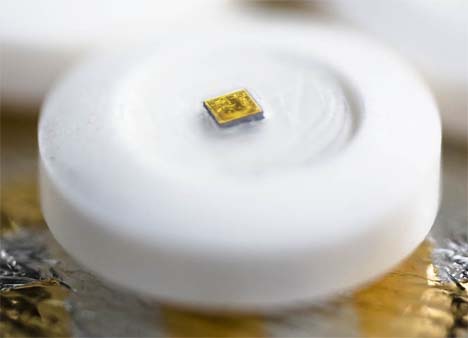Can better tools overcome the medical compliance crazy?


This is especially true with common antibiotics. Many people stop taking their pills when they feel better, the result being the bugs come back and gain immunity. This costs all of us. (Picture from Proteus Biomed.)
I'm guilty of this myself. At least once each month I look at my 7-day pill dispenser and see that the previous night's (or day's) meds haven't been taken. Healthier living has reduced my hypertension symptoms, but I still kick myself when I forget.
In the last few years technology companies have been looking for ways to improve compliance with medication schedules. Here are just a few:
- iReminder, an alert sent to your phone or via a text message, reminding you to take your medication.
- GlowCaps, which sit on top of your medicine bottle and light up when it's time to dose up.
- OnTimeRx, which uses SMS, email and phone to deliver reminders.
- SIMpill, a Web-based reminder service that claims a 94% success rate.
New gear is coming out all the time, and blogs like AmeliaTek Medication Compliance stay on top of the field so I don't have to.
Unfortunately, compliance also has to fight the crazy. Like this nonsense from "health ranger" Mike Adams, claiming compliance is part of some nefarious government plot.
Adams was reacting to this testimony from Roger Felder, who heads the Medical Automation Research Center at the University of Virginia, and who is a founder of WellAware Systems, a compliance monitoring company focused on places like nursing homes.
In his testimony Felder happened to mention Proteus Biomed, which is in clinical trials on an ingestible microchip that can alert heart patients when it's time to take a pill and avoid a heart attack, the chip messaging a patch in the patient's shoulder, then giving them an alert.
(They also make implants called ChipSkin for incorporating active electronics into medical devices. One of their investors is the Carlyle Group. I'm still checking to see if the Trilateral Commission or the Queen of England are involved.)
When Mohit Kaushal, a staff director at the FCC, suggested to the same committee that maybe Medicare should reimburse patients for this life-saving technology, a full-scale freak-out was the result. Big Brother to track your medical compliance.
Uh, no. If you don't want a memory aid with your medication no one is going to make you buy it. But this does not mean Big Brother isn't coming to get you. That's just death knocking on your door. Feel free to open it, Mike.